SUV Tires vs Car Tires: What’s the Difference and Which Do You Need?
Last updated on August 11th, 2025

When it comes to choosing the right tires for your vehicle, one size definitely does not fit all. Whether you’re driving a compact sedan or a full-size SUV, the tires beneath your vehicle play a critical role in safety, comfort, and performance. But what’s the actual difference between SUV tires vs car tires? And how does choosing the wrong type affect your ride, fuel economy, and even tire lifespan?
In this comprehensive guide, we’ll dive deep into the car tires vs SUV tires debate, helping you understand the key distinctions, use cases, and how to make the best decision for your driving needs.
Why This Topic Matters
If you’ve ever walked through a tire shop or browsed an online catalog, you’ve likely seen labels like passenger, touring, SUV, or light truck. And maybe you’ve asked yourself: Does it really matter what type I choose?
Short answer: Absolutely.
Choosing between passenger car tires vs SUV tires isn’t just a matter of fit—it’s about safety, handling, durability, and even how much you pay at the pump.
In this post, we’ll explore:
- The technical and structural differences between SUV and car tires
- How those differences affect real-world performance
- Key considerations when switching tire types
- Actionable advice for making the right tire choice
- Real-world use cases for both types of tires
Structural Differences: What Sets SUV Tires Apart?
Let’s start with the basics. While SUV tires and car tires may look similar, they’re built quite differently beneath the rubber.
1. Load Capacity and Construction
SUV tires are designed to carry heavier vehicles and loads. They often feature:
- Reinforced sidewalls
- Tougher internal plies
- Higher load index ratings
- More durable rubber compounds
Car tires, on the other hand, are built for:
- Lighter vehicles like sedans, hatchbacks, and coupes
- Greater ride comfort
- Better fuel efficiency due to lower rolling resistance
📊 Example: A mid-size sedan may use tires with a load index of 91 (1,356 lbs per tire), while a comparable SUV might require a tire rated at 104 (1,984 lbs per tire).
2. Size and Tread Design
SUV tires are generally larger in diameter and wider, with deeper tread patterns optimized for off-road grip, traction, and all-weather performance. These tires may also feature aggressive shoulder designs for added traction in mud or snow.
Car tires prioritize:
- Smooth handling on paved roads
- Shallow, closely spaced tread patterns
- Less road noise
3. Sidewall Strength
SUV tires have stronger, stiffer sidewalls, allowing them to better support high ground clearance and handle the extra weight from towing, cargo, or passengers. Car tires are more flexible, giving them an edge in ride smoothness and cornering finesse.
Performance Comparison: Car Tires vs SUV Tires in the Real World
Ride Comfort and Noise
- Winner: Car Tires
- Car tires usually offer a quieter, more comfortable ride due to their smaller size, lighter construction, and smoother tread.
- SUV tires tend to be noisier, especially those with aggressive all-terrain patterns.
- Car tires usually offer a quieter, more comfortable ride due to their smaller size, lighter construction, and smoother tread.
Fuel Efficiency
- Winner: Car Tires
- Because of their lower rolling resistance and lighter construction, car tires typically result in better gas mileage.
- SUV tires are heavier, which can reduce fuel efficiency by 1–3 MPG on average.
- Because of their lower rolling resistance and lighter construction, car tires typically result in better gas mileage.
Load Carrying and Towing
- Winner: SUV Tires
- Designed for heavier loads, SUV tires are ideal for towing trailers, carrying passengers, or packing for long road trips.
- Designed for heavier loads, SUV tires are ideal for towing trailers, carrying passengers, or packing for long road trips.
Off-Road and All-Weather Capability
- Winner: SUV Tires
- With deeper grooves and wider tread blocks, SUV tires offer superior traction in snow, rain, gravel, or light off-roading.
- Car tires can struggle in harsh weather or rugged terrain.
- With deeper grooves and wider tread blocks, SUV tires offer superior traction in snow, rain, gravel, or light off-roading.
Can You Use Car Tires on an SUV?
This is a common question—and it comes with a strong warning.
No, you should not use standard car tires on an SUV unless the tire specifically meets your SUV’s load and size requirements.
Installing passenger car tires on an SUV can lead to:
- Premature tire wear
- Reduced braking performance
- Increased risk of blowouts
- Insurance and warranty voiding
If you’re driving a crossover SUV or compact SUV, some all-season passenger tires may be compatible—but only if they meet or exceed OEM (original equipment manufacturer) specs.
Comparison Table: SUV Tires vs Car Tires
| Feature | SUV Tires | Car Tires |
| Load Capacity | Higher (supports heavy vehicles) | Lower (for lighter cars) |
| Tread Depth | Deeper (better off-road grip) | Shallower (better fuel economy) |
| Sidewall Strength | Stronger and reinforced | Softer and more flexible |
| Ride Comfort | Slightly rougher | Smoother and quieter |
| Fuel Efficiency | Lower MPG | Higher MPG |
| Ideal Terrain | All-weather, off-road capable | Paved roads and urban environments |
| Typical Vehicle Type | SUVs, crossovers, trucks | Sedans, coupes, hatchbacks |
Real-Life Scenario: The Weekend Adventurer vs The Daily Commuter
The Weekend Adventurer (SUV Tires)
Sam owns a Ford Explorer and enjoys camping trips on weekends. He often drives through gravel roads and sometimes tows a small boat. Sam opts for all-terrain SUV tires with reinforced sidewalls and deep treads.
Result: Great grip on mixed terrain, better stability while towing, and peace of mind in all weather conditions.
The Daily Commuter (Car Tires)
Jane drives a Honda Civic to work daily in an urban setting. Her focus is on quiet performance, comfort, and fuel efficiency. She sticks with high-quality all-season passenger car tires.
Result: Smooth city driving, better MPG, and low road noise.
Conclusion
Understanding the difference between SUV tires vs car tires isn’t just about terminology—it’s about choosing the right tool for the job. SUV tires offer rugged durability and heavy-load capability, while car tires deliver smoother rides and fuel savings.
Whether you’re hauling gear for a road trip or commuting through the suburbs, always match your tires to your vehicle type, driving style, and weather conditions.
✅ Pro Tip: Check your vehicle’s owner manual or door jamb label to find the recommended tire type, size, and load rating.
Ready to find the perfect tire for your SUV or car?
Explore our in-depth tire buying guides or contact a certified tire professional for personalized advice.
FAQ: SUV Tires vs Car Tires
1. Can I use SUV tires on a car?
Not recommended—SUV tires are heavier and may affect your car’s handling, braking, and fuel economy.
2. What’s the main difference between SUV tires and car tires?
SUV tires are built for heavier loads and off-road conditions, while car tires focus on comfort and fuel efficiency.
3. Are SUV tires more durable than car tires?
Yes, SUV tires generally have stronger sidewalls and are made from tougher compounds to handle extra weight and rough terrain.
4. Do SUV tires reduce gas mileage?
They can. SUV tires are usually heavier and have higher rolling resistance, which may lower your MPG slightly.
5. Are all-terrain tires the same as SUV tires?
Not exactly. All-terrain tires are a type of SUV tire designed for mixed on/off-road use. Some SUV tires are made only for highway driving.
6. Can I put car tires on a compact SUV?
Only if they meet the manufacturer’s load and size specifications. Always check the vehicle’s recommended tire type.
7. Which is better for snow: SUV tires or car tires?
SUV tires with deeper treads generally perform better in snow, but dedicated winter tires are best for both types of vehicles.
8. Are SUV tires louder than car tires?
Yes, SUV tires often produce more road noise due to their aggressive tread patterns and size.
9. Do SUV tires last longer than car tires?
Not necessarily. Longevity depends on tire quality, driving habits, and road conditions—not just the tire type.
10. How do I know if my vehicle needs SUV tires?
Check your owner’s manual or the tire label inside the driver-side door. It lists the correct tire size, type, and load rating.








